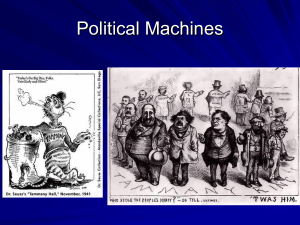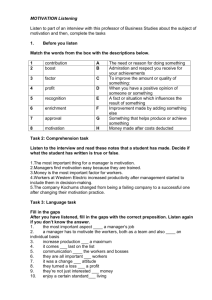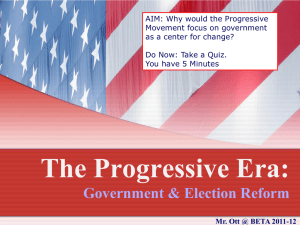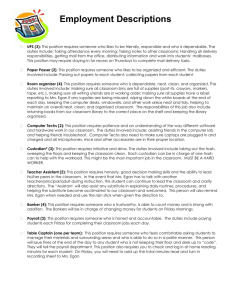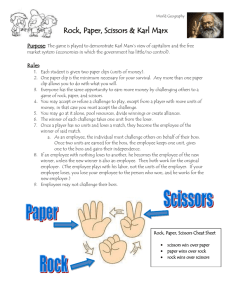The next job boom - Global Human Resource Solutions
advertisement
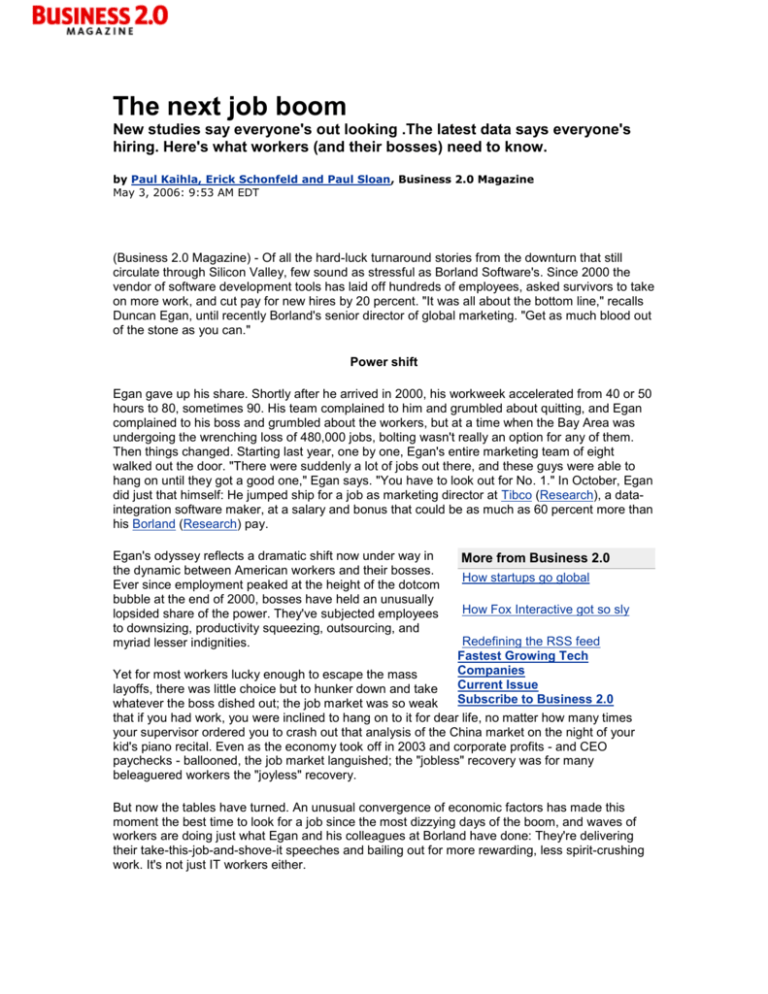
The next job boom New studies say everyone's out looking .The latest data says everyone's hiring. Here's what workers (and their bosses) need to know. by Paul Kaihla, Erick Schonfeld and Paul Sloan, Business 2.0 Magazine May 3, 2006: 9:53 AM EDT (Business 2.0 Magazine) - Of all the hard-luck turnaround stories from the downturn that still circulate through Silicon Valley, few sound as stressful as Borland Software's. Since 2000 the vendor of software development tools has laid off hundreds of employees, asked survivors to take on more work, and cut pay for new hires by 20 percent. "It was all about the bottom line," recalls Duncan Egan, until recently Borland's senior director of global marketing. "Get as much blood out of the stone as you can." Power shift Egan gave up his share. Shortly after he arrived in 2000, his workweek accelerated from 40 or 50 hours to 80, sometimes 90. His team complained to him and grumbled about quitting, and Egan complained to his boss and grumbled about the workers, but at a time when the Bay Area was undergoing the wrenching loss of 480,000 jobs, bolting wasn't really an option for any of them. Then things changed. Starting last year, one by one, Egan's entire marketing team of eight walked out the door. "There were suddenly a lot of jobs out there, and these guys were able to hang on until they got a good one," Egan says. "You have to look out for No. 1." In October, Egan did just that himself: He jumped ship for a job as marketing director at Tibco (Research), a dataintegration software maker, at a salary and bonus that could be as much as 60 percent more than his Borland (Research) pay. Egan's odyssey reflects a dramatic shift now under way in the dynamic between American workers and their bosses. Ever since employment peaked at the height of the dotcom bubble at the end of 2000, bosses have held an unusually lopsided share of the power. They've subjected employees to downsizing, productivity squeezing, outsourcing, and myriad lesser indignities. More from Business 2.0 How startups go global How Fox Interactive got so sly Redefining the RSS feed Fastest Growing Tech Companies Yet for most workers lucky enough to escape the mass Current Issue layoffs, there was little choice but to hunker down and take Subscribe to Business 2.0 whatever the boss dished out; the job market was so weak that if you had work, you were inclined to hang on to it for dear life, no matter how many times your supervisor ordered you to crash out that analysis of the China market on the night of your kid's piano recital. Even as the economy took off in 2003 and corporate profits - and CEO paychecks - ballooned, the job market languished; the "jobless" recovery was for many beleaguered workers the "joyless" recovery. But now the tables have turned. An unusual convergence of economic factors has made this moment the best time to look for a job since the most dizzying days of the boom, and waves of workers are doing just what Egan and his colleagues at Borland have done: They're delivering their take-this-job-and-shove-it speeches and bailing out for more rewarding, less spirit-crushing work. It's not just IT workers either. In sector after sector, from health care to advertising to retail to accounting, pent-up demand for workers that has been building for four years is boiling over, strengthening employees' hands and emboldening them to jump ship. A recent survey of more than 14,000 employees and human resources managers by compensation consultancy Salary.com found that fully 65 percent of workers planned to be hunting for a new job in early 2006. "We've been in a buyer's market for labor, the buyers being employers," says Ed Montgomery, a former U.S. deputy secretary of labor and dean of the University of Maryland's College of Behavioral and Social Sciences. "That's over. Workers have options. That's a big deal." The productivity squeeze The forces behind this transformation aren't altogether obvious - indeed, at a time of slowing GDP growth, massive deficits, war, and other dark clouds, it can be difficult to swallow the idea that we're in a golden age for job-hopping. Underlying job creation remains lackluster, the worst ever at this point in a recovery in the last half-century. But the newly inviting job market has surprisingly little to do with job growth; it is instead the result of a collision between low unemployment and collapsing productivity. In March the unemployment rate fell to 4.7 percent, widely considered full employment. For college-educated workers, the figure has dropped even more sharply, to 2.2 percent. Meanwhile, productivity - a measure of the amount of work done by each employee - actually declined in the last quarter of 2005 and is expected to post its worst showing in almost a decade this year. Strip away the economic wonkery, and the upshot is clear: Bosses can't squeeze more work out of existing workers, and there aren't many new workers, particularly skilled ones, out there. Something's got to give, and increasingly that's the worker giving notice. The Bureau of Labor Statistics's so-called quit rate, a measure of, as the name implies, people who have quit, has swelled by a third since 2003. There are now about 2.6 million people leaving their jobs each month, the same level as in the pre-9/11 economy. Job openings, meanwhile, have increased by almost half a million positions since last summer. Nigel Gault, the U.S. economist for forecasting firm Global Insight, expects the quit rate to rise further during the next several months. "A lot of people really weren't happy where they were but had no choice, so they toughed it out and waited for things to get better," Gault says. "Now they're making moves." Labor mobility As workers move, of course, bosses countermove, and the result is a volatile labor market that teems with opportunity for employees - and peril for companies trying to hang on to them. The stories of people who've jumped and of employers trying to stay staffed up thus become instructive primers on how to navigate the new job terrain and can provide inspiration for anyone who's still stuck with a ball-and-chain job or a tyrannical boss - or just dreams of finding a better gig. But move fast: The current situation is the job market equivalent of an unusual astronomical event. The planets have rarely if ever been aligned quite like this, and the period of optimal conditions is likely to be fleeting. "There's a dynamic in the labor market now that you don't usually see," says David Huether, chief economist of the National Association of Manufacturers. For workers, he says, "the time to strike is now." For those contemplating such a strike, the first requirement is often a kind of psychological shift. You've gotta believe. In some workplaces the atmosphere was so bleak for so long that workers simply have a hard time accepting that the job market really is in a welcoming mode. Many workers still remember heavyhanded management moves like Circuit City's in 2003. In perhaps the symbolic peak of boss power and worker helplessness, the electronics retailer laid off its top- paid commissioned salespeople - 3,900 of them - in one fell swoop. It replaced them with hires who made an hourly wage, eliminating commissions. In some cases, the new hires made 75 percent less than their predecessors. But now Circuit City (Research) itself provides reassuring evidence of the changing jobs equation: Many of the store managers who oversaw its workforce overhaul are now themselves heading for greener pastures. Manny Alvarez was the third of four department managers who recently jumped ship from Circuit City's giant store in Pittsburg, Calif. He says the elimination of commissions made it hard to hold on to hourly sales associates, who typically stayed only a few months. At the same time, the company squeezed store managers by raising their sales targets. "I complained to my district manager, 'Your managers are getting burned out,'" Alvarez recalls. "I was working 10 to 12 hours a day and weekends." (Circuit City declined to comment.) Alvarez, who had earned a license as a real estate agent, decided to test the waters in December - and found them far more inviting than he'd imagined. Within two weeks he had offers from three competing retailers and 10 offers from real estate brokerages. In January, Alvarez signed on as an agent with San Francisco-based Royal Pacific Mortgage & Realty. He expects his pay this year to be double his Circuit City salary. "The economy is much better, and I want to relax a bit," he says. "It was time to move on." E-mail farewells Samantha Shields started to believe in December when she suddenly noticed that her inbox was speckled with farewell e-mail from co-workers in the Banana Republic division of San Franciscobased Gap. She'd moved to the division in 2000 as a project manager for new-store openings, and Gap began massive layoffs about six months later. Shields survived, but she groaned under the increased workload and annual raises that barely kept up with inflation. "I felt like I was working for the government," she says. "It was miserable." But she also felt trapped by the dotbombed job market of the Bay Area - "grateful," she says, "to even have a job." The stream of goodbye-and-good-luck e-mail began to change that. Hearing the stories of people who'd found life - and jobs - after Gap (Research) spurred Shields to float her resume, and she immediately landed three interviews. Two led to offers, and she leveraged that competition into a 37 percent pay increase at the company she joined, cosmetics retailer Bare Escentuals. She's in charge of store openings and expects to oversee the doubling of the chain's outlets to 60 during the next few years. There are only two people between her and the CEO instead of five, and she says her new bosses actually listen to her ideas. "I no longer dread going into the office," she says. Job creation throughout the States Shields's experience underscores another factor affecting the worker-boss balance of power. Places like Austin, New York, and Seattle, which were hurt badly during the downturn and had lagged the national recovery, are now surpassing their old employment highs. The Big Apple, for instance, is positively booming: It lost 56,237 jobs between November 2000 and July 2003, but it now has 133,000 more jobs than it had during its bubble peak. Even the most hard-hit areas Boston and San Francisco, for example - are finally adding jobs again. The gains in all these markets are across many sectors (including retail, where Shields scored). But they're also coming from a resurgent Silicon Valley and increased startup activity across the country that is creating a wide-open exit ramp for frustrated workers who think now is the time to create, say, the next Amazon.com. Some of them even come from the old Amazon. After years as a product manager at the iconic online retailer, Barnaby Dorfman left in January for a startup. He wasn't miserable, but says he "longed for that feeling of really blazing new trails again." He interviewed at six Silicon Valley companies and gave notice without having formally accepted a new job. He landed at Peerflix, a DVD trading service, and says he's happy to be back at a place with 20 workers rather than 12,000: "There are a lot of great opportunities if you just take the plunge." For some workers, it's less a matter of taking the plunge than taking the time. Carolyn Goodwin, who recently left an investment banking post in JPMorgan Chase's Houston office to start a company that provides custom gifts for corporate events and weddings, says it took four months on top of the 60-hour weeks she was working - to examine her options and make her decision. She says she hears countless friends talking about jumping. "The big limitation for a lot of them is finding the time to make the jump," she says. "You can always put it off." Some workers have developed tactics to attack that very problem. Russ Foltz-Smith's approach might be described this way: If your boss is working you to death, look for a new job on your boss's time. Foltz-Smith is on his fourth job in five years and has been through two turnarounds. During the downturn, he had to clock 70-hour weeks at his Los Angeles-area job. But he says he carved out time to plot his escape. He budgeted 5 percent of his workweek for job searching roughly half an hour each morning. He used his company computer and was intensely systematic. In one of his job searches, Foltz-Smith set a goal of sending his resume to 1,200 headhunters and hiring managers, expecting that 200 would actually read it and he'd score five interviews. He assembled his target list on an Excel spreadsheet, getting leads by scanning job boards and lists of the top employers in Southern California, and drilling into company websites to find the names of HR directors. (He also printed his resume on T-shirts emblazoned with his motto - "Russell Smith will make you a lot of money" - and handed them out to interviewers.) In 2003, when employment was still crashing, Foltz-Smith used his system to jump from online directory Citysearch to a VP post at search engine Business.com for a 25 percent pay hike. Then he jobhopped again, landing at hot El Segundo, Calif., startup PureVideo; he got a six-figure salary and holds thousands of founder's shares. "I am blown away by how great this gig is," he says. When you have workers going to such lengths to plan jailbreaks - and succeeding - it's obvious that the game has changed for bosses too. Companies must adapt to the shift in worker power, and across many sectors, they're desperately scrambling to do so. And across industries Take advertising, for example. Madison Avenue was hit particularly hard after the bubble burst, and traditional ad agencies continue to struggle as companies spend more of their marketing budgets on the Internet. That has set off a run on ad people well-versed in digital and interactive media - from cell phones to computer games to TV-on-demand - on both the technical and creative sides. In turn, that has bosses like David Cohen, the U.S. director of digital communications for Universal McCann, frantically trying to hold on to the workers they have and adding new ones as fast as they can. "I liken it to the real estate market in Manhattan," Cohen says. "If someone comes in to interview and you don't give that person a job offer on the spot, chances are there will be a competing offer in 24 hours. And then it's a bidding war." Cohen has increased his staff from 40 employees a couple of years ago to 130 today, and has 20 openings for mostly mid- to senior-level positions that can command base salaries of up to $150,000. He's spending a lot of time trying to figure out how to retain his people, who are constantly bombarded by headhunters. Cohen says he's stemmed the flow of defections of late not just by boosting compensation - it's up 30 percent from a few years ago, he says - but by trying to improve the workplace environment. The company has expanded and upgraded its training programs, is now paying for people to go to conferences that interest them, and is encouraging people to leave work at a reasonable hour. Cohen concedes that the latter might have sounded like management heresy not long ago in a business known for its frenetic late-night brainstorming sessions. "But we're trying to foster an environment that doesn't frown at people who leave at 6 p.m.," he says. Other companies are resorting to recruiting and retention ploys that seem straight out of the 1999 playbook. Seattle-based aQuantive, an advertising firm that specializes in creating digital and new-media campaigns, is trying to fill spots at its Atlas division by loading a flatbed truck with billboard-size signs ("What Drives You?" screams one) and cruising it past other tech companies. Part of Atlas's pitch is that its stimulating work atmosphere doesn't trap the worker in a cubicle and promotes a highly collaborative approach to software coding known as "extreme programming." To demonstrate that atmosphere, the flatbed truck also features a replica of part of the company's office, complete with computers and workers. Recent drive-bys: Amazon, Getty Images, RealNetworks, the University of Washington - anywhere restless engineers might lurk (other than Microsoft, Atlas's biggest customer). "The sell is not a financial sell," says Adam Kapel, an Atlas vice president. "That can only last so long. If work is boring, people will leave." The defense industry has been in hiring mode since 9/11 but now may be the sector hardest hit by the shifting balance of power between employees and bosses. ManTech, a Fairfax, Va., company that operates military surveillance and communications systems, currently has 450 job openings it can't fill, but it has managed to add 1,000 workers in just the past seven months - at least some of whom were no doubt enticed by a company policy of giving new hires a shot at winning a fancy car. The company is giving away a high-ticket luxury item every few months to select recent hires. Last month it was a BMW Z4 convertible. To keep the workers it already has, ManTech (Research) last year began tying executive bonuses to retention rates; if a manager can lower voluntary departures in his unit, he can boost his bonus by a double-digit percentage. ManTech has also begun conducting two sets of exit interviews when a worker leaves - the second one six months after the employee's departure. Robert Coleman, ManTech's president, says workers open up more after they've been away for a while and sometimes reveal that they were alienated by a problem manager. If that happens, the manager is often sent for special training, a kind of worker retention boot camp. More important, ManTech also uses the second exit interview to bring defectors back into the fold. Coleman says, "They might have found that the grass on the other side isn't as green as they thought it was going to be." How long will workers keep their current edge? It's impossible to know, and there are economic scenarios under which power could quickly revert toward management. Another external shock on the order of 9/11 or, say, $100-per-barrel oil could swiftly put workers back at the mercy of their bosses. Some economists also worry that, even absent such events, the U.S. economy could be headed into serious trouble because of towering fiscal and trade gaps, high consumer debt, a slowing housing market, and anemic overall wage growth. While examples of double-digit pops in salaries for skilled workers in tight labor markets abound, total wages for all workers have risen only slightly since the downturn. Taken together, all these factors lead some economists to believe that we may be headed for an unstable period of weakening consumer spending that derails the five-year-old recovery and ultimately stifles hiring. In terms of the workplace power dynamic, the more likely scenario is that employees will maintain their big advantage for at least another year. That's because, if GDP growth cools as is widely expected, productivity is also expected to decline, keeping the pressure on managers to hold on to their workers and hire new ones. And for many companies, the cycle of losing workers weary of the postbubble grind is far from over. Back at Borland, there's renewed turmoil, and yet another turnaround CEO has recently been brought in. He's fighting Nasdaq's recent order to delist the company. He's already laid plans to sell off some businesses and enter new ones, shaking things up all over again. Thus Borland is facing a whole new wave of disaffected workers tempted to jump - and this time, they'll have plenty of places to land. Paul Kaihla is a senior writer at Business 2.0. Erick Schonfeld and Paul Sloan are editors-atlarge. To send a letter to the editor about this story, click here. From the May 1, 2006 issue



